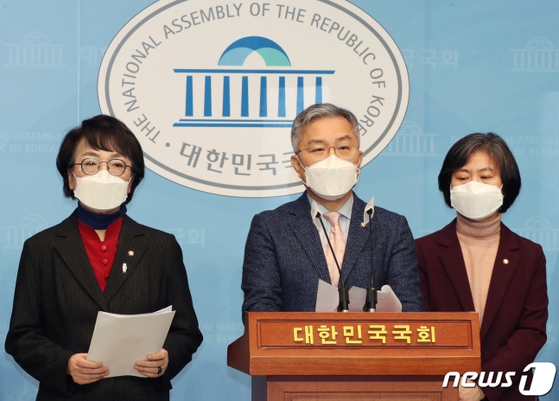On the 5th, the day after the criminal passports gathered together to deal with the lawsuit for impeachment of the judges, the Open Democratic Party proposed a punitive damages compensation bill (amendment to the Media Arbitration Act) for media companies.
![On the morning of the 5th, Kang-wook Choi, CEO of the Open Democratic Party (center), is holding a press conference at the communication hall of the National Assembly in Yeouido, Seoul to prevent misinformation and introduce punitive damages for false reports. On the left is Rep. Kim Jin-ae, and on the right is House Representative Kang Min-jung. [뉴스1]](https://i0.wp.com/pds.joins.com/news/component/htmlphoto_mmdata/202102/05/fe77465b-1a12-45e4-94f3-a909dd772586.jpg?w=560&ssl=1)
On the morning of the 5th, Kang-wook Choi, CEO of the Open Democratic Party (center), is holding a press conference at the communication hall of the National Assembly in Yeouido, Seoul to prevent misinformation and introduce a punitive damage compensation system for false reports. On the left is Rep. Jin-ae Kim, and on the right is National Representative Kang Min-jung. [뉴스1]
Members of the Open Democratic Party, including Representative Kang-wook Choi, Representative Kang Min-jung, and Representative Kim Jin-ae,
At a press conference, he revealed the purpose of the bill, saying, “The public’s right to know is being damaged by malicious reporting, and the conservative party is using fake news from the media as a tool for political dispute.” In addition to 3 members of the Open Democratic Party, 9 members of the Democratic Party participated in the bill as co-sponsors.
◇Compensation for the amount of sales… Most powerful of all laws
▶Introduction of disciplinary compensation system for media outlets ▶Expanding the functions and authority of the mediation committee ▶Strengthening requirements for political information, etc. is the main point of the bill.
The most controversial of these is the punitive compensation system. If the court determines that a media article is a false or distorted report for the purpose of slander, it is said that it imposes a punitive compensation amount exceeding the profits (regulated by sales) obtained by the media during the period the article was reported. For example, if a media company with annual sales of 100 billion won publishes fake news for a week, it means that it will have to compensate for the amount exceeding about 1,917 million won (100 billion won ÷ 365×7).
In addition, it included the introduction of the judging team to the existing media arbitration committee, and granting the right to impose corrective orders and compulsory performance (up to 20 million won) to entrust similar functions to the current Korea Communications Commission.
◇The Democratic Party 6 Act already exists… Choi Kang-wook “Weak”
On the 3rd, the Democratic Party, which had previously launched a mutual growth TF for media and media, gathered opinions at the top of the list to select six media reform-focused bills and handle them in February. To make it easier to deal with the National Assembly, the Democratic Party
Six non-issue bills were selected first. Among them, there is a punitive damages bill (initiated by Congressman Yoon Young-chan), but it is a bill that is subtracted from the media companies.
A member of the lawmaker who was involved in the selection of the bill said, “The bills that sharply disagree between the opposition parties, such as punitive damages to the media, were excluded, and focused on remedy for consumer damage.” Supreme Commissioner Roh Woong-rae, head of the TF, also drew a line at the Supreme Council’s meeting on the 4th, saying, “(6 bills) are nothing more than or less than the purpose of remedying consumer damage.”

The Democratic Party’s February National Assembly’s list of key bills for media reform. Graphic = Younghee Kim [email protected]
However, supporters of strong passport criticism criticize this as “a lacking reform”. After the six bills were announced, criticism has been raised in various pro-institutional communities, saying, “What media reform is it if we remove the media from the subject of punitive damage compensation?” . Also, arguing that Lee Nak-yeon was a newspaper reporter, it was argued that “in the future, we must filter out politicians from journalists.
As if conscious of this, the Open Democratic Party initiated the bill and insisted that it was “(Democratic Party Bill) the range and standard of compensation is much weaker than the contents of our bill” (CEO Kang-wook Choi) and “the bill you have been waiting for” (Rep. Kim Jin-ae). .
◇Another Judge Impeachment Season 2?
As in the case of the impeachment of judges, there are observations that the issue of media reform is also being swept away by the arguments of strong supporters. Earlier, the party leadership was lukewarm about the impeachment of judges, but as the demands of strong supporters increased, they endorsed the impeachment as if they were dragged.
There are already several similar legislation in the Democratic Party. Representative Chung Cheong-rae’s amendment to the Media Arbitration Act, which claims up to three times more punitive damages to the media, is representative. It was omitted from the Democratic Party’s Priority 6 Act because of the large disagreement between the ruling and opposition parties, but if the Open Democratic Party’s bill draws attention, the amendment of the lawmaker can always be empowered. Kim Seong-soo, professor of political science and diplomacy at Hanyang University, said, “If the demands of the hard-liners in the party become larger, there is a possibility that the Democratic Party will immediately pass the punitive damages bill.”
Experts warned that if the ruling party introduces a punitive damages system, it would cause serious infringement on freedom of speech. Lee Jun-woong, professor of media and information science at Seoul National University, said, “This government was able to take office because there was a press courageously accusing the fall of power. However, it is difficult to understand that a bill that severely reduces the accusation function is being discussed.”
Reporter Kim Jun-young, Intern Reporter Kim Soo-hyun [email protected]
